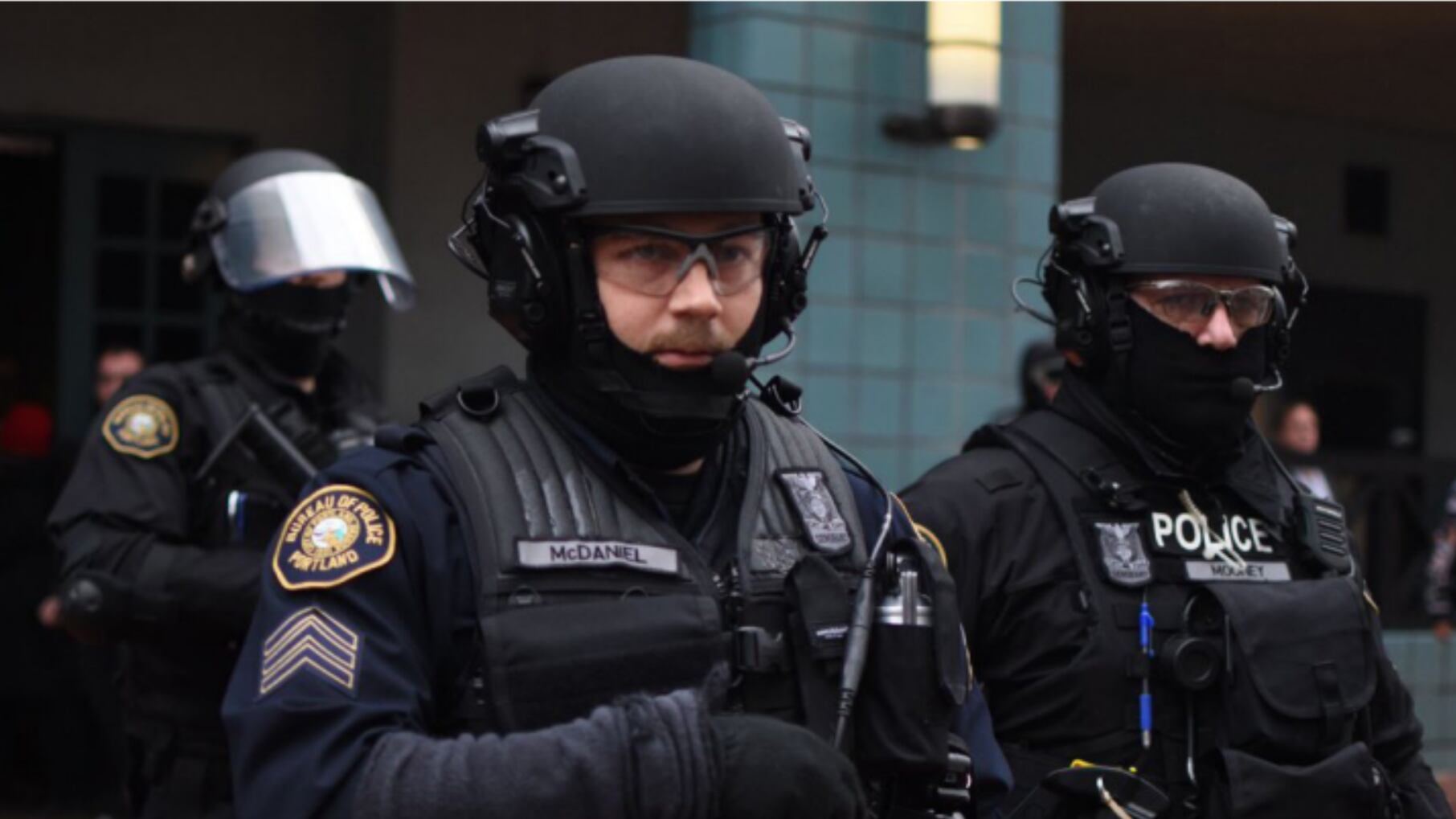A yearlong investigation into how an image glorifying violence against protesters made it into Portland police training materials has finally produced results—and more questions.
Last week, the city suspended Portland Police Sgt. Jeff McDaniel for 10 days without pay after concluding he was “more likely than not” responsible for inserting the meme, which shows a man in a helmet and body armor beating a “dirty hippy” and is titled “Prayer of the Alt Knight,” into a training presentation on crowd control.
The Portland Police Bureau initially attempted to fire McDaniel, but Police Chief Chuck Lovell ultimately decided to suspend him instead. McDaniel denied inserting the meme, and his union argued the city couldn’t prove he was lying.
Advocates say it’s too little too late. “Too often, when officers are aware of problems within the bureau, there’s only silence—and that silence does not allow for accountability,” says Juan Chavez, an attorney for the Oregon Justice Resource Center who has filed many lawsuits against the Police Bureau.
Despite the yearlong investigation, it remains unclear how many people viewed the offensive slide. Only one other person interviewed by investigators admitted to having been aware of it.
That was Cmdr. Craig Dobson, who told investigators he found the slide “during his presentation at the 2018 Oregon Basic [Rapid Response Team] training,” according to the Feb. 21 disciplinary letter released by the city. Dobson told investigators he confronted McDaniel, who oversaw the training. McDaniel told him the slide “was for humor,” Dobson told investigators.
The bureau’s crowd control policies have been under scrutiny in recent years. A decade ago, the city settled a lawsuit filed by the U.S. Department of Justice over Portland’s history of police using excessive force against people with mental illness and, more recently, protesters. The city hasn’t abided by the settlement agreement, the DOJ alleges, and the case is ongoing.
On Monday, OJRC’s Chavez filed legal documents in that case, raising questions about the slide investigation, notably: Why didn’t the commanding officer who said he became aware of the slide in 2018 report it to his superiors? And why, if it thought McDaniel was lying, didn’t the Police Bureau fire him?
“The city’s primary concern appears to be avoiding litigation, either from the community or by [the Portland Police Association], not in creating or upholding a true accountability system,” Chavez wrote Feb. 27 in that court filing. “The outcome [of the investigation] will do little to change the parts of the system and police culture that allow the pattern and practice to persist.”
In a statement, Mayor Ted Wheeler defended the decision not to fire McDaniel—pointing to PPA’s formidable track record for getting officers’ firings overturned during arbitration (“Winning Record,” WW, Feb. 8).
“I believe that we have imposed discipline that recognizes the reality of the legal framework we must operate within,” Wheeler said. “Discipline imposed by the chief and myself has been overturned by arbitrators far too often because our recommendations are perceived as being too harsh.”
The PPA applauded the bureau’s “very thorough investigation,” arguing that although McDaniel had kept a copy of the offending presentation, there was no evidence to prove he’d created it. “Police officers are human beings and are not perfect,” the union said in a press release. “When they make mistakes, they are entitled to the same due process rights and standards of evidence as all other American citizens.”
What is noteworthy about Sgt. McDaniel, however, is how often Portland protesters have taken him to court, alleging actions in keeping with “Prayer of the Alt Knight.” Those lawsuits, all filed in U.S. District Court in Portland, have had limited success. Here’s what happened:
When: Nov. 17, 2011
What happened: An Oregonian cameraman captured McDaniel pepper-spraying Liz Nichols in the mouth during an Occupy rally.
Ruling: Nichols lost. A federal jury ruled McDaniel’s use of force wasn’t excessive.
When: Oct. 12, 2016
What happened: Again, McDaniel was accused of pepper-spraying a protester. This time by Allyson Drozd, who was at City Hall to protest the ratification of a new police labor contract.
Ruling: Again, the jury wasn’t convinced McDaniel was at fault. A video played at trial didn’t show the spraying.
When: Jan. 20, 2017
What happened: Matthew McGaugh was peacefully protesting President Donald Trump’s inauguration when he was tackled, tear-gassed and arrested by Portland riot police, according to the legal complaint. McDaniel was one of the officers alleged to have ordered his arrest.
Ruling: McGaugh demanded $100,000 in damages. He got a $15,000 settlement.
When: June 4, 2017
What happened: Police used nonlethal munitions and herded protesters into a tight group after hundreds of Portlanders arrived downtown to protest a Patriot Prayer rally. Two sued the city and responding PPB officers, including McDaniel.
Ruling: Judges threw both cases out, saying officers had “reasonable suspicion” to detain the counterprotesters.

